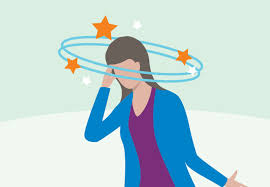The Different Types Of Vertigo And Treatments
Vertigo is a feeling of being dizzy, nauseous, & imbalanced. Vertigo is the leading cause of dizziness and disorientation among adults.
It is of various types, each having different symptoms and course of vertigo treatment.
Your vertigo treatment highly depends on the exact type of vertigo you’re experiencing.
There are two types of vertigo: Central Vertigo, and Peripheral Vertigo.
Central Vertigo refers to a problem with the brain and the parts of it that control the body’s balance. Most often, it is caused by a problem with the central nervous system or the spinal cord.
Peripheral vertigo can be attributed to an inner ear issue, an ear infection, a head injury, or some other unknown cause.
It’s also important to remember that vertigo is not a disease in itself, rather a symptom of some underlying disorder.
It’s important to find out the exact cause of your vertigo in order to treat it effectively.
Types of Vertigo
There are two types of vertigo; central & peripheral. Central vertigo arises due to an issue with how the brain processes sensory information related to maintaining balance.
Peripheral vertigo is caused by an issue with the inner ear. The inner ear helps maintain the body’s balance & hearing through a delicate network of structures called the labyrinth, the vestibular nerve, & the auditory nerve.
When even a single one of these structures has a problem, the patient feels dizzy, out of sorts, & unbalanced.
Some of the most common causes of Peripheral Vertigo are:
Benign Paroxysmal Positional Vertigo(BPPV): BPPV is caused by tiny calcium crystals in the middle ear breaking loose & depositing inside the semicircular canal of the inner ear. There, they cause problems with the way the inner ear maintains balance & sends signals to the brain. This makes a patient feel dizzy, disoriented, nauseous, & as if their surroundings are moving.
Vestibular Neuronitis, also known as Vestibular Neuritis: It is an infection of the vestibular nerve that leads to the nerve becoming swollen & inflamed. This causes hindrance in the transmission of balance signals from the brain to the inner ear & vice-versa through the concerned nerve. A lot of infections, including the cold, flu, measles, mumps, chickenpox, rubella, & more can cause Vestibular Neuritis.
Meniere’s Disease is another inner ear disorder that is caused by an excessive amount of fluid inside the ears. Meniere’s Disease leads patients to feel dizzy, nauseous, & other vertigo-like symptoms. It can also cause hearing loss, tinnitus, & a feeling of pressure inside the ears.
Other conditions that can cause Peripheral Vertigo to include:
Labyrinthitis: It is an inner ear infection caused by viruses or bacteria & tends to cause swelling in the labyrinth. It leads to people feeling dizzy, nauseous, & disoriented. Other vertigo-like symptoms are also common.
Perilymph Fistula: It is caused by an ‘opening’ or a break in one of the window membranes between the middle ear and the inner ear. It causes people to feel extra pressure inside their ears & vertigo-like symptoms.
Superior semicircular canal dehiscence syndrome(SSCDD): It is caused by a bony part of your semicircular canal, that carries fluid inside your ear, breaking down and leaking fluid from one part of the ear into another.
Head injuries, neck injuries, ear surgery, & any other issues too, can cause peripheral vertigo in some people.
Peripheral Vertigo treatment:
Most cases of Peripheral Vertigo are treated by addressing the exact underlying issue.
For BPPV:
Exercises like the Epley Maneuver, the Brandr-Daroff exercises, & the Semont maneuver help in vertigo treatment.
Anti-dizziness and anti-nausea medications also help.
Antihistamines
Anti-anxiety pills and antidepressants may also be recommended
Antibiotics & anti-viral medications may be given when vertigo is caused by an infection
Water pills, also known as diuretics, are given to patients with Meniere’s Disease.
Vestibular Rehabilitation Therapy is recommended for patients with long-term, chronic vertigo.
Home remedies like taking Ginkgo Biloba, vitamin supplements, & getting a good night’s sleep are also recommended.
In some cases, surgery might be needed to fix any issues that aren’t responding to medication and exercises.
Peripheral Vertigo prognosis:
In most cases, peripheral vertigo is easily treatable & often goes away on its own without any medical intervention. In other cases, it can become chronic and recurring in nature, especially if the root of the problem is not addressed.
Central Vertigo:
Central Vertigo causes sudden, abrupt onset of vertigo symptoms. It also tends to last for a longer time period than peripheral vertigo, & is usually more severe than the former.
It’s common for patients to be unable to stand or walk properly during one of central vertigo attacks.
Uncontrollable nystagmus is also a key feature of central vertigo. It is severe and more random as compared to peripheral vertigo & doesn’t go away when you’re asked to fix your attention on a single object.
Hearing issues & tinnitus are rather uncommon with central vertigo. However, headaches, swallowing problems, general fatigue, and weakness are common signs of central vertigo.
Central Vertigo causes:
A spinal cord or brain injury is often what causes central vertigo in most people. Other conditions can also be the culprit at times. These include:
Any head injuries
Illnesses or infections
Multiple sclerosis
Migraines
Any kind of brain tumors
Strokes
Transient ischemic attacks(TIA), also known as mini-stroke. These are strokes that last for a short time and don’t usually cause any long-lasting damage to the vital organs.
Finding and treating the exact underlying cause of central vertigo is the best treatment for it.
For example, if Multiple Sclerosis is causing the central vertigo symptoms, then medications and therapies to manage it might help control central vertigo attacks too.
Similarly, for migraine induced central vertigo, migraine medicines and stress reduction activities might prove helpful.
The same goes for Brain Tumors, head injuries, spinal cord injuries, & other brain problems.
The adequate treatment of any underlying issues is the only way to treat & manage central vertigo in patients.
Additionally, you should always be on the lookout for signs and symptoms that may be a reason to visit the ER.
These include:
Slurred speech or bizarre movements
Fainting or losing consciousness
Vomiting profusely
inability to hold down food or liquids
Difficulty breathing
Confusion or lack of oxygen
If any of these symptoms appear with the vertigo-like symptoms of both types of vertigo, you should visit the emergency room immediately.
These could signify a larger problem than Vertigo.
You could also try performing some exercises to help get relief from your vertigo symptoms. However, before beginning any of the exercises, it’s best to consult with your doctor first. It is important to not make your condition worse than ever.











0 Comments:
Post a Comment